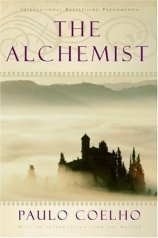
When I borrowed The Alchemist to read last week, I
wasn’t sure what to expect. I’d remembered the hype of the short read by Brazilian author Paulo Coelho, but didn’t know for the life of me what is what about. So I did something I rarely do; I skipped the inside flap and dove into the book without any idea what I would be reading. And I wasn’t disappointed.
The Alchemist is the story of Santiago, a self-made shepherd boy who is attuned to the world around him, who seeks the interpretation of a reoccurring dream by a Gypsy woman. After so obscure directions from the woman, Santiago meets an old man in a village who changes the direction of his life. Santiago decides to sell his flock of sheep and travel in search of his Personal Legend, which is the true path God has laid out for him to follow. The boy leaves his old life in Spain and journeys through the desert toward Egypt.
Along the way the boy runs into some hang-ups, but remains undaunted. He knows that he will reach his goal in time, and along the way learns how to immerse his soul into the world around him and listen to the omens in his life. On meeting an alchemist in the desert, the boy learns the last of what he needs to go to seek the treasure waiting for him on the other side of the desert.
Though this book was published in 2006, Coelho has created a story that reads like a spiritual fairytale. Think of any story from Arabian Nights combined with your favorite childhood story that had a happy ending. Santiago’s life is a depiction of what anyone can do to be happy with life.
The simplicity of this book gives the reader the opportunity to focus on the life themes the shepherd’s quest presents. Coelho has written a tale about choosing a path that is right for you and following it no matter what challenges arise. The belief in signs and omens as being hints left by the world to help you on your journey is a reassuring thought, and one that will even the only vaguely spiritual can get behind.
And the lesson that you can only be truly happy by following your heart is one every person has been taught since kindergarten, but is a message typically lost somewhere during puberty and now rekindled by this book. Santiago is reminded of this again and again as he contemplates settling down during periods of the book where he feels mostly content. Despite how happy he is at the time, his heart will not settle unless he is seeking his own Personal Legend.
But it is the intertwining spiritual themes Coelho writes about that really make this story. Santiago is a Christian who interacts amicably with Arabs in the Muslim lands he travels through. Very often the boy and those who help him speak of following a true path laid out by God that only he can find for himself, which is a belief that correlates with any number of world religions. And the Gypsy woman who reads his dream and the alchemist he meets in the desert add an element of the occult to the boy’s travels.
None of these religious traditions Coelho writes about are touted as better than the other. Rather, they are almost interchangeable as various characters in the story speak about their lives and how God has been the central figure in all they have accomplished. The all believe that with faith and God and personal resilience, anyone can achieve his goals.
It’s this comforting optimism that seeps through Santiago’s journey and stays with you after the book is closed. Coelho has created a literary outlet that is both an enjoyable read and subtle way to bolster your faith in yourself and in what the world has to offer.
ليست هناك تعليقات:
إرسال تعليق